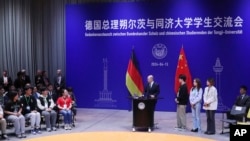German Chancellor Olaf Scholz is calling for fair competition in trade with China while urging the European Union to not adopt protectionist policies against Beijing. The bloc has been considering tariffs amid concerns about Chinese goods being dumped on European markets and overproduction.
Scholz is in China on a three-day visit. He is expected to meet with President Xi Jinping Tuesday in Beijing before ending his trip, which is his second to China since taking office in 2021.
According to the Reuters news agency, Beijing is expected to urge Berlin to not support EU measures to stem the influx of Chinese-made vehicles and wind and solar equipment into Europe.
Referencing what he views as unfounded fears when Japanese and South Korean cars first entered the German market, Scholz said, "At some point there will also be Chinese cars in Germany and Europe. The only thing that must always be clear is that competition must be fair," Scholz told students at Tongji University in Shanghai.
He also said, “In other words, that there is no dumping … there is no overproduction [and] … copyrights are not infringed.”
China has been Germany’s largest trade partner for eight consecutive years as of 2023.
In December, EU leaders urged China to fix its trade imbalance with Europe. In 2022, the EU recorded a $426 billion trade deficit with China, more than any year before. The EU has also urged China to press Russia to end its war in neighboring Ukraine.
Scholz is expected to question Beijing’s close economic ties with Moscow more than two years into Russia’s invasion of Ukraine. Xi has long denied he is partial to the Kremlin.
Berlin has also been concerned about the possibility of a Chinese invasion of Taiwan. Without calling China out directly, Scholz said that borders “must not be moved by force” and that, “We should not be afraid of our neighbors.”
China considers self-governing Taiwan a wayward province and has not ruled out the use of force to unify it with the mainland.
Scholz’s arrival in China on Sunday was overshadowed by an Iranian attack on Israel. Nearly all of more than 300 missiles and drones launched by Iran and its proxies were intercepted by Israel and its allies.
The attack has fueled fears of a wider regional conflict. Scholz has joined other Western leaders in warning Iran not to strike again and urged Israel against retaliating.
Some information in this report came from Reuters and The Associated Press.






